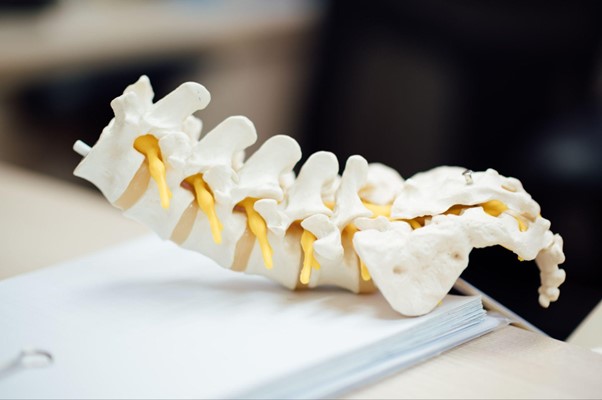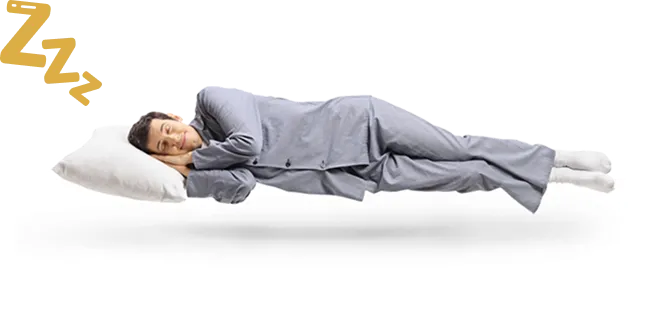Mattress Science
November 2023What are the best sleep positions for those who have DDD (degenerative disc disease)?
As anyone who has suffered back pain knows how frustrating it can be when it comes to bedtime. Along with the fatigue that follows the day after. Degenerative disk disease (DDD) is a spinal issue that can make it harder to sleep. You may find your physical discomfort compounded by a lack of rest, adding to the challenges you face in managing your symptoms. So, let’s look into DDD a bit further.

Sleep & Degenerative Disk Disorder (DDD)
- What is DDD?
- What are the symptoms of DDD?
- How does DDD affect sleep?
- What are the best sleep positions for those who have DDD?
- Can your mattress make a difference?

What is DDD?
Before we can identify the best sleep positions for those who have DDD, we need to understand a bit more about what it is and how it works.
The first thing to stress is that, surprisingly, DDD isn’t actually a disease. It’s a condition that occurs as a natural part of the ageing process. However, it can affect younger people in some cases, particularly if they have a history of spinal injuries or a physically demanding job.
DDD is caused by the discs in your spine breaking down over time, becoming less elastic and losing water content. These discs act as shock absorbers in your spine, protecting your vertebrae as you move, twist or exert yourself. As they break down, this kind of movement can begin to cause friction – and this leads to pain and discomfort.
What are the symptoms of DDD?
The symptoms of DDD are varied, and not everyone whose discs wear down will experience them. Issues can include:
- Pain in the affected region of the spine. This can be persistent or occasional.
- Stiffness, particularly after prolonged inactivity.
- Decreased range of motion
- Tingling and numbness in your extremities
- Muscle weakness
As DDD is a progressive condition, these symptoms can develop and worsen gradually over time, leading to an increasing impact on your life – and, unfortunately, on your sleep.
How does DDD affect sleep?
While DDD can have a major impact on your day, that impact can be just as significant through the night. DDD can affect your sleep in variety of ways:
- Increased pain and discomfort. Depending on the specific impact DDD has on your discs, you may find that lying down exacerbates your symptoms. This will make it harder to fall asleep or cause you to wake in the night.
- Difficulty in changing positions. If you experience stiffness as a result of DDD, this will likely worsen through the night due to a lack of movement. This can mean that changing position in the night becomes challenging, and you’re more likely to wake up.
- Stress-related issues. Like any chronic condition, DDD can contribute to your stress levels. If DDD is disrupting your life or causing significant pain, you may find yourself experiencing emotional distress that makes it more difficult for you to fall asleep.
As you can imagine, these various issues can have a major impact on your sleep quality. And this, in turn, can contribute to a range of health challenges – a vicious cycle that can cause significant issues.
But it’s important to recognise that it doesn’t have to be this way. There are things you can do to maintain a good quality of sleep despite the difficulties of DDD – and it starts with finding the best sleep position.

What are the best sleep positions for those who have DDD?
As you can no doubt guess, your sleep position is key to securing a good night’s sleep if you have DDD. The wrong sleep position can exacerbate your symptoms and make it more difficult for you to get the rest you need.
Unfortunately, there’s no one-size-fits all answer to the best sleep position for those with DDD. It depends on a number of factors, including your overall physical health, your weight, and the specific part of your back that is most affected.
Here are some factors to consider when deciding on the best sleep position for you:
- Sleeping on your back is generally considered the best option for spinal support, so you may want to try this first. Placing a pillow under your knees can also help to preserve the natural curve in your lower back.
- Adopting the foetal position – on your side with your knees up toward your chest – can also have some benefits by opening up the space between your vertebrae. If you try this position, consider placing a pillow between your knees for added comfort.
- Stomach sleeping is generally considered a bad idea for people with any kind of back issue, as it makes it harder to avoid putting strain on your spine. If you do adopt this position, make sure you place a pillow under your pelvis to avoid strain on your lower back.
- Pillow support is essential regardless of your sleeping position. Make sure that your pillows offer good neck and spine support to avoid exacerbating your issues.
As you can see, there are various options to try out when it comes to finding the best sleeping position. The key thing is to pay attention to your body – does a particular position cause less discomfort through the night? Does one leave you feeling less stiff in the morning than another?
Of course, finding the best sleeping position won’t be as beneficial as it could be if you’re lacking proper support. And that means you should also be thinking about your mattress.

Can your mattress make a difference?
Your mattress can make an enormous difference to the quality and consistency of your sleep. When it comes to people with back issues, this is even more important – if your mattress isn’t giving you the support you need, you’ll likely face more consistent symptoms and greater difficulty in sleeping. For DDD sufferers, in particular, this is bad news.
It’s also worth considering that mattresses don’t last forever. In fact, over time your mattress will become less supportive. It may begin to sag in places, or become uneven. Given that unintended movement can be extremely painful for DDD sufferers, this is something to avoid.
If you’re trying to work out if your mattress is helping you get the sleep you need, consider:
- Support. Some people find softer mattresses more comfortable, but you need to make sure your mattress is able to give your spine the proper support. Choosing the right firmness level for your mattress is key here – but as we’ve explained elsewhere, it can be more complex than it seems.
- Motion isolation. If you share your bed, you’ll want to make sure that any movement by your partner doesn’t disturb you. This means getting a mattress that doesn’t transmit movement easily.
- Cleanliness. If your mattress is older or hasn’t been maintained well, it can develop mould or other unpleasant features. This can obstruct your breathing or cause rashes – another source of discomfort you won’t want to struggle with if you’re a DDD sufferer.
There are also a range of different mattress types, each of which will have different benefits and drawbacks to consider.
The first step, of course, is to decide whether your current mattress is helping or hindering your quest for a great night’s sleep. If you have your doubts, it might be time to consider a replacement.
Finding the right mattress for you
For DDD sufferers, preserving your quality of sleep is essential. Otherwise, you’ll find it even harder to manage your symptoms and maintain your overall health.
But if you’re looking to upgrade your mattress to something that offers better support and greater comfort, it can be hard to know where to start. There are a lot of options out there – which is going to fit your needs best?
Well, your best bet is to work with a mattress specialist who can provide you with a full range of options – and who can point you in the right direction, too.
Let us help you find the right mattress
Here at John Ryan by Design, we’ve been providing top-quality mattresses to our customers for over 20 years. We’re committed to delivering a personal service – we want you to get the mattress you truly deserve and that fits your needs best. Read our mattress buying guide for more detailed information on how to pick the right mattress for you.

Dreaming of the perfect nights sleep?

Ask us a question
There are over 6000 questions and answers submitted by you on all questions about mattresses and bed problems. Enter a keyword such as Vi Spring, John Lewis beds, bad back or Memory Foam and see if your question has already been answered.
If you can’t find an answer in knowledge hub, ask a new question. We aim to respond to all questions within one working day.
Newsletter
Enter your email to join our newsletter. We’ll send you occasional news and mattress expertise.
